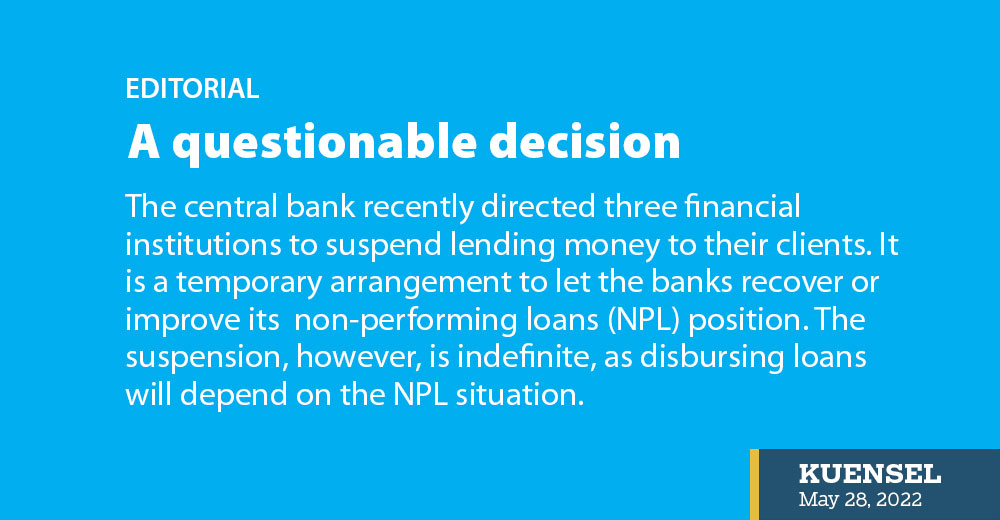The central bank recently directed three financial institutions to suspend lending money to their clients. It is a temporary arrangement to let the banks recover or improve its non-performing loans (NPL) position. The suspension, however, is indefinite, as disbursing loans will depend on the NPL situation.
NPL is not good for banks. It has to be at the minimum. But restricting banks from lending is no better, especially when two of the three banks cater to the financially illiterate or those in the least developed sector agriculture. Restricting access to finance to this clientele is against policies like that of financial inclusion.
Banks will have to improve on their NPL. They should come up with remedial measures or improve their recovery. At the same time, restricting them from lending will affect their business. How will banks do business without lending money? Unlike the commercial banks that thrive on lending, BDB and CSI have other mandates. Most of their clients are farmers or small scale businesses. Without the service, access to finance- from profit driven commercial banks is beyond their reach.
The central bank has found out, through its own research, that basic financial products and services like credit facilities make a substantial positive difference in people’s lives. Financial inclusion, it (RMA) said, has the potential to improve the financial well-being of the unserved and underserved segments of the population.
The banks (BDBL and CSI) affected by the decision cater to those who are deprived of the facilities of the commercial or private banks. A private bank, for instance, will not lend Nu 1 million to a farmer willing to mortgage his one-acre land, even if cattle he owns included. A Bank, like we say, is someone who lends an umbrella when it is a bright day and takes back the umbrella when it rains.
BDB and CSI have different mandates. The umbrella becomes bigger no matter the weather condition. The only condition is those protected should not bask in the sun or play in the rain. Access to finance in the country is among the lowest in the region if not in the world. In 2020 agriculture and animal husbandry received only 3.83 percent of the total credit holding. In real terms, it is only Nu 6,392 million.
Suspending loans to the needy because some had not paid back is not right. NPL happens for so many reasons. It is not only the farmer affected by weather conditions or a proprietor because of the Covid-19 pandemic. Excluding them from access to finance will jeopardise the national objective of sustainable and inclusive socioeconomic growth. The central bank recognised the contribution of the CSI sector and the importance of providing them with credit facilities.
Whether lending to a farmer, a start-up or a rich businessman, the tricks are there for all to know. A farmer could ask his son or daughter to get a vehicle loan to buy a power tiller or an agriculture loan to buy a new car for the civil servant son or daughter. NPL can be controlled in many ways if banks are wiser. It is said that NPL in the transportation sector happened because of alleged collusion between bank officials and clients. Why should a bank lend Nu 6M when the truck cost Nu 3M. They will not be able to recover the loan if the truck is put up for auction after a year of purchase.
NPL happens for so many reasons. Depriving some could be construed against the Constitution which mandates the state to promote those circumstances that would enable the citizens to secure an adequate livelihood.


